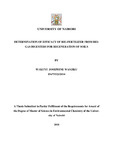| dc.description.abstract | Life on earth cannot be sustained without food and people have to employ all known tactics to improve food production. Farmers generally use inorganic fertilizers and compost manure for the improvement in food production. The compost manure is obtained directly from animal waste. Animal waste is also used to generate biogas. If the by-products of biogas production can be utilized as manure, it would be more economical to utilize all the animal waste in biogas production and use the by-products as manure. The main aim of this study was to determine the efficacy of bio-fertilizer from biogas digesters for regeneration of soils. The nutrient quality of the soil was determined by measuring the levels major, macro- and micro- elements in the experimental plots both before and after application of the different fertilizers. The study took place in a farm in Nyeri County, between the months of September to November 2015. The experiment was done in a plot that had not been cultivated before. The plot was subdivided into 3 different blocks each having its own treatments and crops in a well-planned array. The first block (A) was treated with bio-fertilizer, the second block (B) was treated with no fertilizer and hence acted as the control block, and the third block (C) was treated with the conventional inorganic fertilizers as per agricultural recommendations. Seven crops were grown in the plots and managed as per agronomic requirements of each specific crop. pH of the soils was deter-mined using standard procedure. The major nutrients Nitrogen (N), Phosphorous (P) and Po-tassium (K) content of the bio-fertilizer were quantitatively determined by Kjeldahl method; UV-VIS Spectrometer and flame Emission spectrometer respectively. The macro and micro elements such as calcium, magnesium, manganese, iron and zinc were determined by Flame Atomic Absorption Spectrophotometer.. Bio-fertilizer use led to a very significant increase in crop yields by 106.7% as compared to not using it, while synthetic fertilizer increased the yields by only 32.7%. This shows that there is a margin difference of 74% meaning that bio-fertilizer is way better than synthetic fertilizer use when it comes to crop growth and yields. The data collected from this study can be very useful in advising farmers on cost effective application of bio-fertilizers to improve crop productivity. | en_US |

